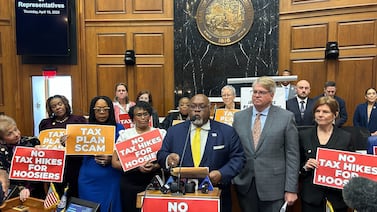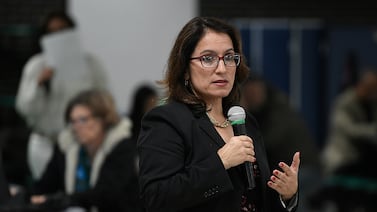Four months after the deadly shooting at Oxford High School, state lawmakers are reviving a 4-year-old plan to make schools safer.
The bipartisan House School Safety Task Force created after the Oxford rampage recently issued its initial recommendations, and more are expected in the coming weeks.
Four Republicans and four Democrats who’ve met more than a dozen times want the state to commission an independent threat assessment for all schools in Michigan. They suggest the state provide grants to address shortfalls that the analysis identifies.
Another priority is to provide state funding for school-based health centers that address both physical and mental health needs.
Mental health has become a priority of lawmakers and educators, not just because mental illness is a factor in school violence but because students need extra support after trauma and isolation during the pandemic.
The group also wants schools to remove immediate threats to classrooms sooner – such as those considered factors in the November Oxford shooting that killed four and injured seven people.
Other recommendations include:
- Asking schools to keep lockdown kits on hand. Each kit might include, for example, food, water pouches, a radio, a flashlight, a safety whistle, hand sanitizer, and a bucket that doubles as a portable toilet.
- Improving communication among schools, local law enforcement, and the state’s OK2Say tip line.
- Adding OK2Say contact information on student IDs.
- Providing incentives for people to become school counselors.
- Refining requirements for active-shooter drills.
- Standardizing floor plan maps for schools.
- Adopting common definitions across school districts for terms including “lock down,” “shelter in place,” and “room clear.”
- Requiring ongoing safety training for school resource officers and other school staff.
- Adding a staff member in each district to oversee mental health services, security, and threat assessment.
Many of the recommendations are based on earlier work by a previous School Safety Task Force created by former Gov. Rick Snyder. That task force morphed into the School Safety Commission, which receives staff support from the Michigan State Police’s Office of School Safety.
“One frustration of mine when we started looking at the 2018 task force was that somebody’s already done a good deal of work, and why were these recommendations not acted upon?” said state Rep. Scott VanSingel, co-chair of the new legislative task force.
A few of the task force’s recommendations were implemented, said Nancy Becker Bennett, who supervises the state police Office of School Safety. Those include updating OK2SAY tip line technology, better defining roles of school safety personnel, and regularly reviewing administrative rules to allow school personnel to receive professional development credit for safety courses.
Twenty other recommendations have not been implemented. Those largely align with the new legislative task force’s recommendations.
VanSingel and the task force’s co-chair, state Rep. Luke Meerman, said they’re confident in making progress under new circumstances.
First, the earlier report was issued just before the pandemic began and policymakers’ priorities shifted. Second, the Oxford shooting created a sense of urgency. Third, the new task force comprises lawmakers themselves, people with the power to introduce bills and the political capital to get colleagues to approve them.
“Our recommendations will actually be introduced as bills. That’s a big step compared to what the 2018 task force was able to do,” said Meerman, a Republican from Coopersville in Ottaway County.
Lawmakers already are drafting bills, and they could be enacted by July.
The task force expects to release its full report in May. It may include more controversial measures that, unlike the initial recommendations, not all task force members agree on.
Discussions topics have ranged from arming teachers to allowing courts to confiscate guns of people deemed to be at risk of hurting themselves or others. Most of those topics were raised by members of the public who submitted comments and suggestions.
Mostly, though, the group has spent its time on substantive debate about moderate measures most people agree on.
“We’ve tried so hard not to politicize this issue, and we’ve worked extremely well together,” said VanSingel, a Republican from Grant in Newaygo County. “We didn’t completely ignore conversations about [gun control] but that hasn’t been the focus of our group. We’re looking at what we can get done together.”
Proponents of the task force’s work want to see reforms that will make a difference without overburdening teachers and administrators.
“Schools are swamped with requirements dealing with academics so to put a whole separate group of requirements on them with school safety is a lot, but it’s important, and they know that,” Becker Bennett said.
Task force leaders say their work is grounded in practical solutions to a real problem — one they heard described in stark and disturbing detail during a private meeting with former Oxford Superintendent Tim Throne.
“As we talked about different topics we compared them to what’s happened. Would this have worked in Oxford? Would this have worked in Parkland?” VanSingel said. “We quickly came to the conclusion that there’s not a one-size-fits-all approach. The more layers of security in place, the less likely these things are going to happen.”
Tracie Mauriello covers state education policy for Chalkbeat Detroit and Bridge Michigan. Reach her at tmauriello@chalkbeat.org.





